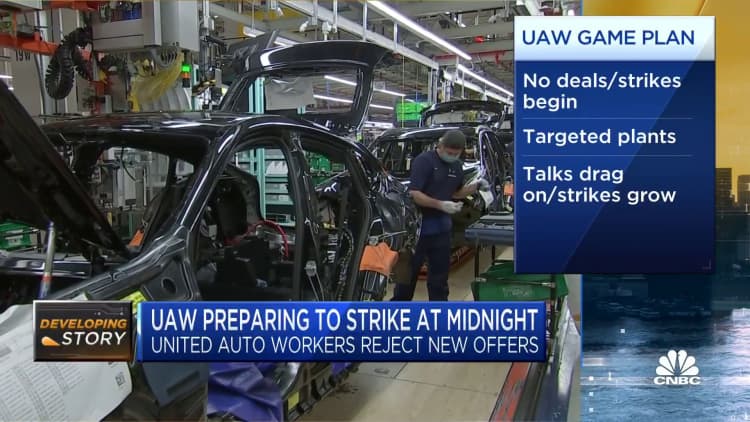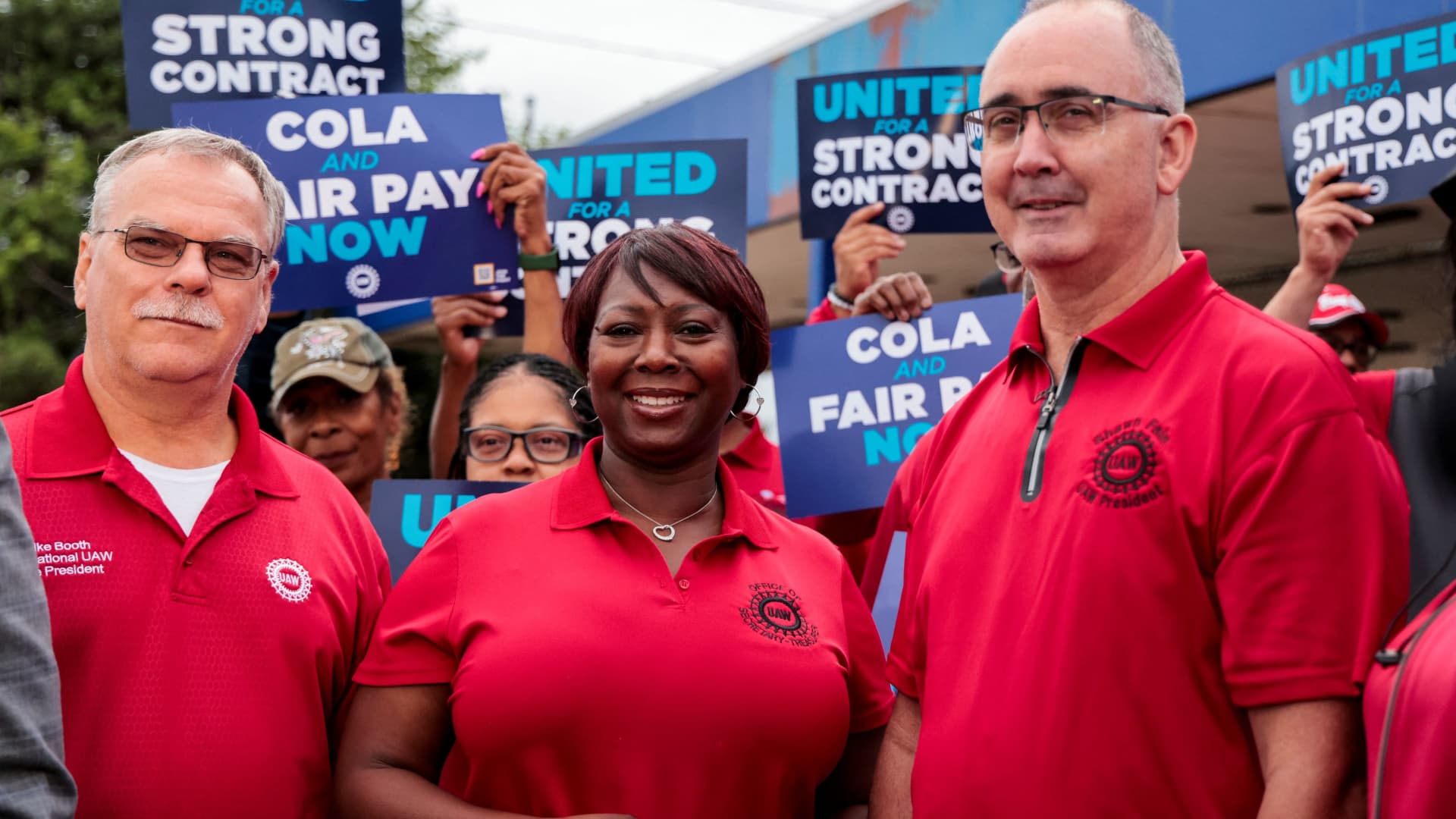United Auto Workers President Shawn Fain greets workers at the Stellantis Sterling Heights Assembly Plant, to mark the beginning of contract negotiati
United Auto Workers President Shawn Fain greets workers at the Stellantis Sterling Heights Assembly Plant, to mark the beginning of contract negotiations in Sterling Heights, Michigan, U.S. July 12, 2023.
Rebecca Cook | Reuters
DETROIT – The United Auto Workers union is preparing to conduct unprecedented, targeted strikes against Ford Motor, General Motors and Stellantis if the sides fail to reach new deals by 11:59 p.m. ET Thursday.
Targeted, or bottleneck, strikes are an alternative to national actions in which the union only strikes select plants. They’re different from when members walk out of all factories and onto picket lines, like what occurred four years ago during the last round of UAW negotiations with General Motors.
Targeted strikes typically focus on key plants that can then cause other plants to cease production due to a lack of parts. They are not unprecedented, but the way UAW President Shawn Fain plans to conduct the work stoppages is not typical. They include initiating targeted strikes at select plants and then potentially increasing the number of strikes based on the status of the negotiations.
“We will strike all three companies, a historic first, initially at a limited number of targeted locations that we will be announcing. Then, based on what’s happening in bargaining, we’re going to announce more locals that are going to be called to stand up and strike,” Fain said Wednesday during a Facebook Live.
Fain referred to the union’s plans as a “stand-up strike,” a nod to historic “sit-down” strikes by the UAW in the 1930s.
While “historic,” the targeted strikes could have unintended ripple effects. It’s not clear how one plant will impact on others. The actions could also potentially send non-striking union members to unemployment lines, if their state allows them to collect any benefits due to being out of work as a result of a strike.
What about lockouts?
The stoppages also more easily open the door for the companies to hire permanent replacement workers and even conduct plant lockouts, according to labor experts.
The UAW’s strategy puts “some heat on the companies,” but it also gives the companies “much more ability” to use such tactics, said Dennis Devaney, senior counsel at Clark Hill who formerly served as a board member of the National Labor Relations Board.
Read more about the Detroit labor showdown
“I think that obviously is not a good thing from the UAW’s perspective,” said Devaney, who also formerly served as an attorney for GM and Ford.
Plant lockouts, in which companies don’t allow workers into a facility, are more common overseas than in the U.S., but they have occurred.
For example, there was roughly a 10-month lockout of workers at an Exxon Mobil refinery in Texas that ended last year upon union ratification of a new agreement. The company said it was done in response to a strike notice issued by the union during negotiations in January 2021 for a new contract.
Automakers, however, may want to continue producing parts and vehicles at plants for as long as they can in the event of the strikes intensifying, especially following years of supply chain disruptions due to parts shortages and the coronavirus pandemic.
There are “significant, important factors” that companies need to take into account to determine if such “actions might be legal and appropriate,” said Jeffrey S. Kopp, a corporate labor attorney with 26 years of experience and a partner at Foley & Lardner.
The UAW knows lockouts are an option, citing “everything’s on the table” for both sides if it comes to striking under the expired deals, said a person familiar with the union’s plans.
Expired deals
The UAW hasn’t conducted a strike like this before because under terms of the union’s national contracts with the Detroit automakers, strikes at individual plants must be over local contracts, not national issues. But Fain said the UAW will strike at local plants over national issues.
(For context, the UAW as an organization has an “international” unit that operates a leader, or umbrella, for local UAW units that all have their own contracts in addition to a national agreement.)
Typically, such actions would be breach of the contracts and could lead to litigation or a complaint with the NLRB. In 1998, for example, GM filed a lawsuit against the UAW claiming a bottleneck strike at two Michigan plants that affected dozens of other company facilities was illegal.

However, according to the union, this rule no longer matters because members are working under expired contracts that nullify those terms.
Ben Dictor, who serves as legal counsel for the UAW, said most of contracts such as wages and working conditions are still in effect but the “no strike, no lockout clause” expires. That means the union can strike, but it also opens the door for the companies to potentially lock out workers.
“As part of the stand-up strike, some of us will be working without a contract. This is an essential part of our strategy to keep the companies off balance by calling locals out on strike based on what is happening in negotiations,” Dictor said in a video posted online Thursday by the union. “That will keep them guessing and turbocharge your national negotiators in bargaining with the big three.”
Strike fund
Conducting targeted strikes can be complex, as it’s not clear how one plant will impact on others. The actions could potentially send non-striking union members to unemployment lines, if their state allows them to collect any benefits due to being out of work as a result of a strike.
Targeted strikes also will save the union cash, as it won’t have to give “strike pay” to as many members from its $825 million strike fund.
The fund pays each eligible member $500 per week, which would mean it has enough cash for roughly 11 weeks if all members went on strike. However, that doesn’t include health-care costs that the union would cover, such as temporary COBRA plans, which would likely drain the fund far more quickly.
When asked about the ability for the strike fund to support the union, Fain has regularly referred to how past union leaders conducted work stoppages without pay and how UAW members need to stick together.
“Nobody’s coming to save us. Nobody can win this fight for us. Our greatest hope, and or only hope is with each other, standing together,” Fain said. “I’ll tell you this, I’m at peace with a decision to strike if we have to because I know that we’re on the right side of this battle.”
www.cnbc.com

COMMENTS